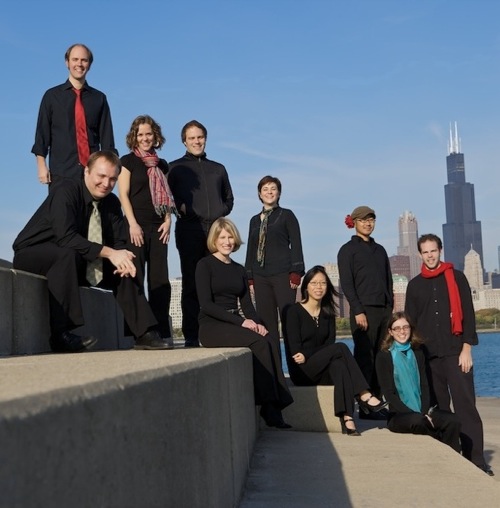dal niente opens with a rewarding night of new music
Dal niente’s season opener at Mayne Stage Wednesday night was the perfect marriage of music and venue. It was a program of fiendishly difficult but ultimately rewarding new music that required the utmost in technique and precision from the musicians. And Chicago’s newest midsize concert hall provided just the right balance of clarity and resonance, allowing the most intimate sounds to blossom yet capable of projecting the occasional shrieks and thuds this music requires without distortion or shrillness.
The program was a miscellany of seven pieces presented in two sets. The first consisted of a varied menu of recent works each of which clocked in at little more than ten minutes apiece. The second set was a recap of the two substantial works that won the group the coveted Kranichstein Stipend at this year’s Darmstadt New Music Summer Courses. Four of the night’s composers were in the house for a mini-symposium during intermission.
New York composer Andrew Cheung was one of those on hand to explicate his Centripedalocity (2008) a dynamic and episodic work for flute, harp, saxophones, clarinet and strings. The composer cited some of his inspirations for this divertimento: Debussy, Strauss, Monk. All were deconstructed, of course, but the Ravel Introduction and Allegro was clearly alluded to both thematically and in the instrumentation.
The prolific Nico Muhly was represented by a 7-minute piece – How About Now (2006) –that was both seductive and playful. As mentioned in his note, Muhly was attempting to write idiomatic music for each of the instruments of his quintet: flute, clarinet, cello, piano and electric guitar, as well as for the ensemble as a whole. He succeeds quite well in this minor but amiable piece.
Dutch composer Michel van der Aa’s Rekindle (2009) pits a solo live instrument (in this case, a flute) against an electronic soundtrack in an imitative and reactive dialogue requiring split-second timing and masterly technique. Flutist Shanna Gutiérrez displayed both in spades.
Eliza Brown, currently at Northwestern’s School of Music, was represented by her piece for flute, clarinet, saxophone, piano and percussion. Uneasy (2009) is made up of highly contrasting segments which she explained as the recontextualizing of things after their destruction.
The final work in the first set was by Marcos Balter, another Chicagoan, currently at Columbia College. Growth (2010), an ensemble piece getting its first public performance at this night’s concert, was organic and developmental from beginning to end, with sharp contrasts in dynamics between strings and winds. Conductor Michael Lewanski kept a sure hand on the group here and in several of the other works during the evening.
Two more substantial pieces closed out the night.
Asche (2004) is by the Frenchman Mark André, at 46 the oldest composer represented on the program. It is a piece of sound sculpture that is composed of disparate noises created in unconventional ways by a quintet of conventional instruments and other objects.
With the bow hitting the violin all over, making percussive as well as acutely scratchy noises, and the prepared piano (played by the amazing Mabel Kwan) producing tones on the keyboard as well as inside the instrument, the work seems to be going nowhere but does get somewhere in the end. One of the many delights along the way is the tiny crackle produced by rubbing two chunks of Styrofoam together.
The final piece, Momentsmusicaux (2004) by Hans Thomalla, a professor of composition at Northwestern, was twice as long as most of the others. This was a large-scale chamber work presenting a broadly-spaced construction which makes reference to Brahms and the flute innovator Theobald Boehm in themes or rather motifs that are compressed, stretched, altered and imitated by violin, cello, piano, saxophones and flute. A ruminative and fairly static work to wind down an innovative and beautifully realized program.
Posted in Performances





